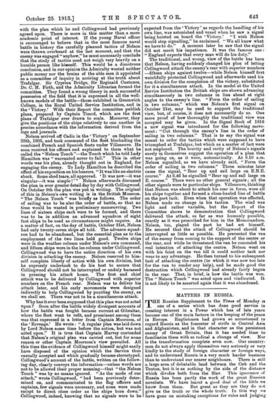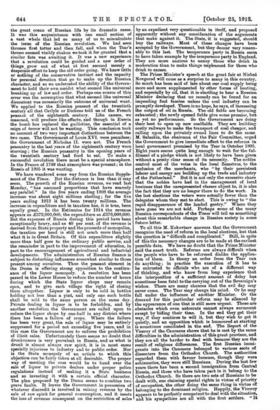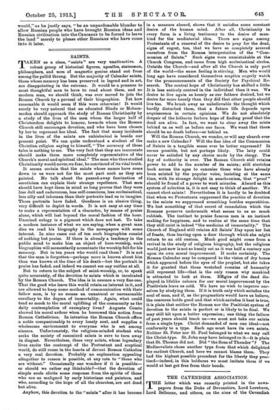MATTERS IN RUSSIA.
THE Russian Supplement to the Times of Monday is one of a series which has done good service in creating interest in a Power which has of late years become one of the main factors in the keeping of the peace in Europe. Englishmen had grown so accustomed to regard Russia as the fomenter of strife in Central Asia and Afghanistan, and in that character as the persistent enemy of Great Britain, that it has needed time to familiarize them with so radical a change of view. Nor is the transformation complete even now. Our country- men do not always apply themselves very seriously or very kindly to the study of foreign character or foreign ways, and to understand Russia is a very much harder business than to understand our nearer neighbours. There is still a large area of debatable land between the Celt and the Teuton, but it is as nothing by the side of the distance which divides both from the Slay. This ignorance of Russia has been partly the work of the great Russian novelists. We have learnt a good deal of the little we know from them. But great as they are they do not give us the truth or the whole truth. In this way we have gone on mistaking exceptions for rules and judging
the great ocean of Russian life by its dramatic cases. It was this acquaintance with one small section of a vast whole that led so many of us to miscalculate the issue of the Russian revolution. We had seen thrones first totter and then fall, and when the Tsar's throne seemed visibly shaken we took it for granted that a similar fate was awaiting it. It was a new experience that a revolution could be guided and a new order of things_ grow out of what at first seemed merely a desperate effort to keep the old order going. We knew little or nothing of the conservative instinct and the capacity for personal devotion that go to make up the Russian character, and so we underrated the ability of the Govern- ment to hold their own amidst what seemed like universal breaking up of law and order. Perhaps one source of this error was the assumption that what seemed like universal discontent was necessarily the outcome of universal want. We applied to the Russian peasant of the twentieth century all that Carlyle or Dickens told us of the French peasant of the eighteenth century. Like causes, we reasoned, will produce like effects, and though in Russia the bomb has replaced the guillotine, the essential of a reign of terror will not be wanting. This conclusion took no account of two very important distinctions between the two cases. The Government of Louis XVI. were penniless; the Government of Nicholas II. were not. The French peasantry in the last years of the eighteenth century were starving ; the Russian peasantry in the opening years of the twentieth century had food to eat. To make a successful revolution there must be a special atmosphere. In the France of 1789 that atmosphere was present; in the Russia of 1905 it was wanting.
We have wandered some way from the Russian Supple- ment of the Times. But the distance is less than it may seem. The growth of the Russian revenue, we read last Monday, " has assumed proportions that have scarcely any parallel." In the five years ending 1908 the average increase was about eight millions sterling ; for the five years ending 1913 it has been twenty millions. The increase in expenditure and in taxation has, it is true, been equally great. In the Estimates for 1914 the revenue appears as £373,000,000, the expenditure as ..€376,000,000. But the expenses of Russia during this period have been exceptionally heavy, and as 40 per cent. of the revenue is derived from State property and the proceeds of monopolies, the taxation per head is still not much more than half what it is in Great Britain. Of this expenditure slightly more than half goes to the ordinary public service, and the remainder in part to the improvement of education, in part to the encouragement of agricultural and industrial developments. The administration of Russian finance is subject to disturbing influences somewhat similar to those present among ourselves. Thus the peasant element in the Duma is offering strong opposition to the continu- ance of the liquor monopoly. A resolution has been passed in the Lower House to reduce the number of hours during which the State liquor shops may remain open, and to give each village the right of closing them altogether. Liquor is only to be sold in bottles holding not less than a pint, and only one such bottle shall be sold to the same person on the same day. Private dealing in liquor is to be forbidden, and by another resolution the Government are called upon to reduce the liquor shops by one-half in any district where there has been a failure of crops. Where the failure has been very great, the sale of liquor may be entirely suppressed for a period not exceeding five years, and in this case the Government are to enforce the prohibition of illicit sales. Unfortunately there seems no doubt that drunkenness is very prevalent in Russia, and as what is drunk is almost always raw spirit, it is in most cases specially injurious to industry and to public order. Nor is the State monopoly of an article to which this objection can be fairly taken at all desirable. The proper way of meeting the case would be to hand over the sale of liquor to private dealers under proper police regulations instead of making it a State business and so investing it with a certain official character. The plan proposed by the Duma seems to combine two grave faults. It leaves the Government in possession of whatever discredit is involved in raising revenue by the sale of raw spirit for general consumption, and it meets the loss of revenue consequent on the restriction of sales
by an expedient very questionable in itself, and proposed apparently without any consideration of the arguments that make against it. The State, it is suggested, should buy the railways. Most of these changes have been accepted by the Government, but they demur very reason- ably to this last. The temperance party in Russia seem to have taken example by the temperance party in England. They are more anxious to annoy those who drink in moderation than to make things unpleasant for those who drink to excess.
The Prime Minister's speech at the great fair at Nizhni Novgorod will come as a surprise to many in this country. So much has been said of late about our coal supply being more and more supplemented by other forms of heating, and especially by oil, that it is• startling to hear a Russian Minister declaring that no remedy can be found for an impending fuel famine unless the coal industry can be promptly developed. There is no hope, he says, of increasing the output of oil in Russia. The old fields are becoming exhausted ; the newly opened fields give some promise, but as yet no performance. So the Government are doing their best to open up new coalfields. They are building costly railways to make the transport of coal cheaper, and calling upon the privately owned lines to do the same M. Salazkin, the chairman of the Fair Committee, urged the Government to give immediate effect to the reforms in local government promised by the Tsar in October 1905.
Eight years seems quite long enough to wait for the ful- filment of a pledge which is not likely to have been given without a pretty clear sense of its necessity. The nobles control most of the votes in the local Zemstvos, to the exclusion of the merchants, who " by their persistent labour and energy are building up the trade and industry of the Fatherland." But it is not only the excessive share that the nobles have had in the management of local business that the unrepresented classes object to, it is also the fact that they are no longer there to do the work. In the last elections the voters were actually fewer than the delegates whom they met to elect. This is owing to " the rapid disappearance of the landed gentry." Where they have gone we are not told. Perhaps some of the many Russian correspondents of the Times will tell us something about this remarkable change in Russian society in some future letter.
To all this M. Kokovtsov answers that the Government recognize the need of reform in the local elections, but that the question is " difficult and complicated." Still, in spite of this the necessary changes are to be made at the earliest possible date. We have no doubt that the Prime Minister said the exact truth. Reforms are always difficult when the people who have to be reformed dislike the applica- tion of them. In theory an order from the Tsar can do anything ; in practice the execution of it has to be entrusted to officials who are of a, different way of thinking, and who know from long experience that the interposition of a sufficient amount of delay has sometimes been fatal to the carrying out of the Sovereign's wishes. There are many chances that the evil day may never come. The Tsar may change his mind. Or he may fall under the influence of another Minister. Or the demand for this particular reform may be silenced by the appearance of one that is still more urgent. These are obstacles which even autocrats cannot always surmount except by biding their time. In the end they get their way, if they continue to will it, but they wish to get it quietly, and an opposition which is humoured at starting is sometimes conciliated in the end. The Report of the Viceroy of the Caucasus shows that he is met by the same
difficulties in the administration of this great province, and they are all the harder to deal with because they are the
result of religious differences. The first Russian immi- grants into the Caucasus belonged to various sects of dissenters from the Orthodox Church. The authorities
regarded them with favour because, though they were
schismatics, they were still Russians. During the last few years there has been a second immigration from Central Russia, and those who have taken part in it belong to the Orthodox Church. So there are two sets of Russians to be dealt with, one claiming special rights in virtue of priority of occupation, the other doing the same thing in virtue of belonging to the dominant religion. Happily, the Viceroy appears to be perfectly competenteto deal with the situation, and his sympathies are all with the first settlers. " It
would," as he justly says, "be an unpardonable blunder to allow Russian people who have brought Russian ideas and Russian civilisation into the Caucasus to be forced to leave the land " merely to please other Russians who have come into it later.
















































 Previous page
Previous page